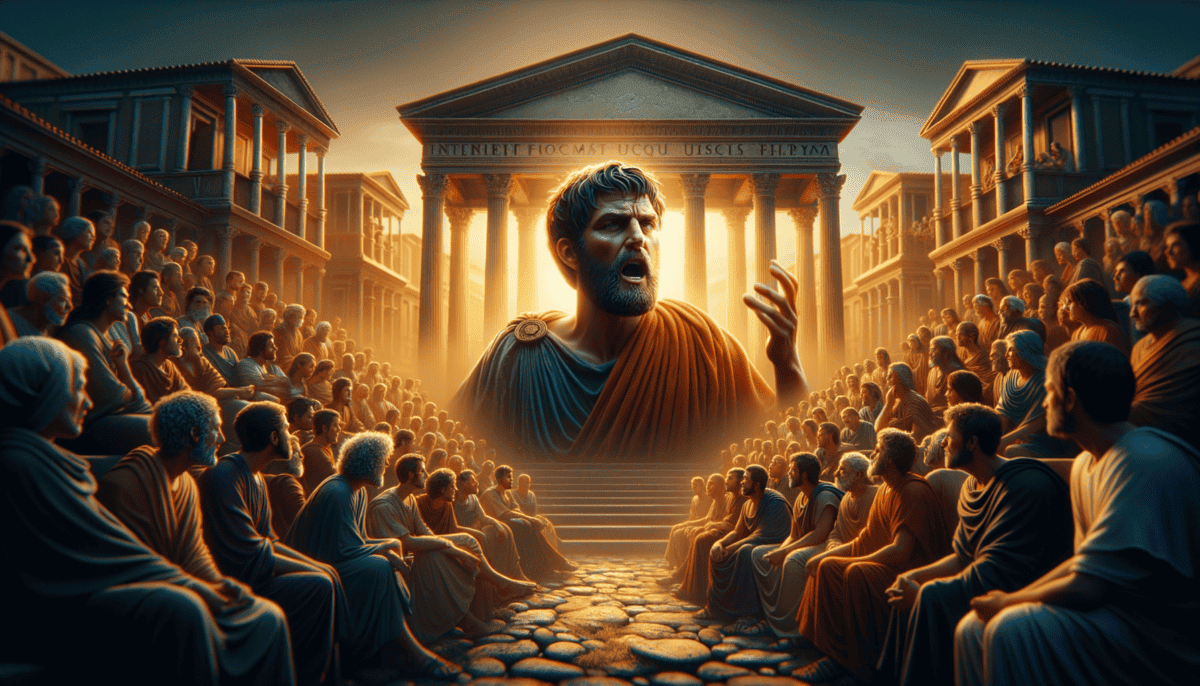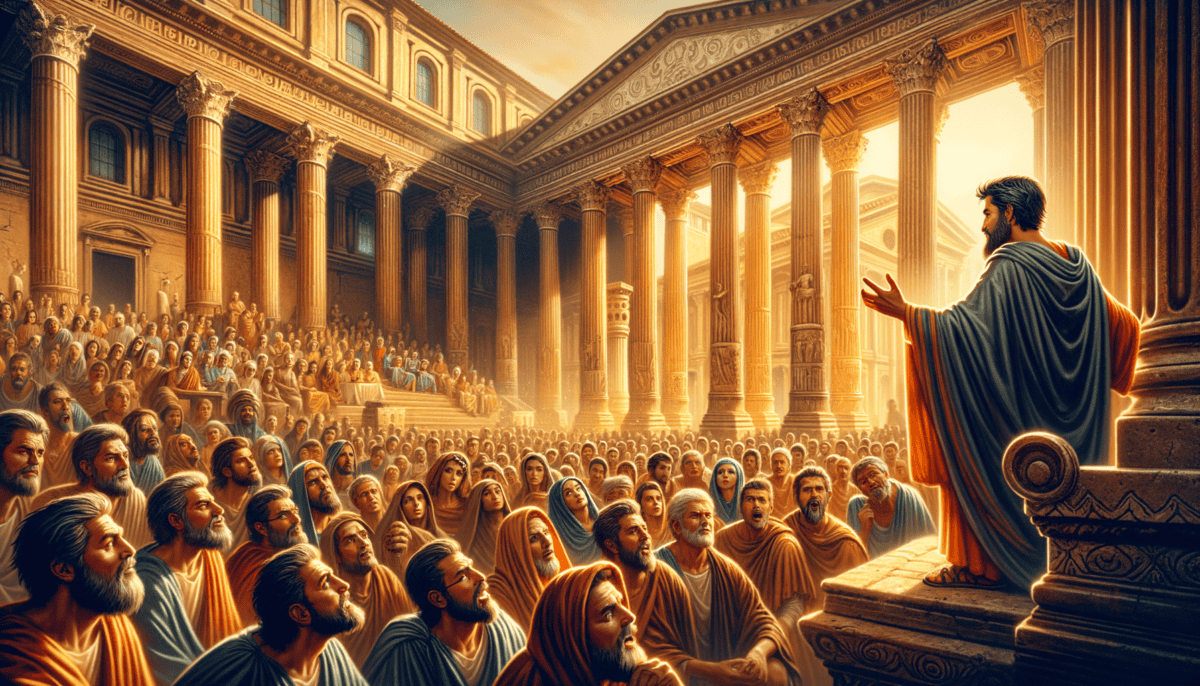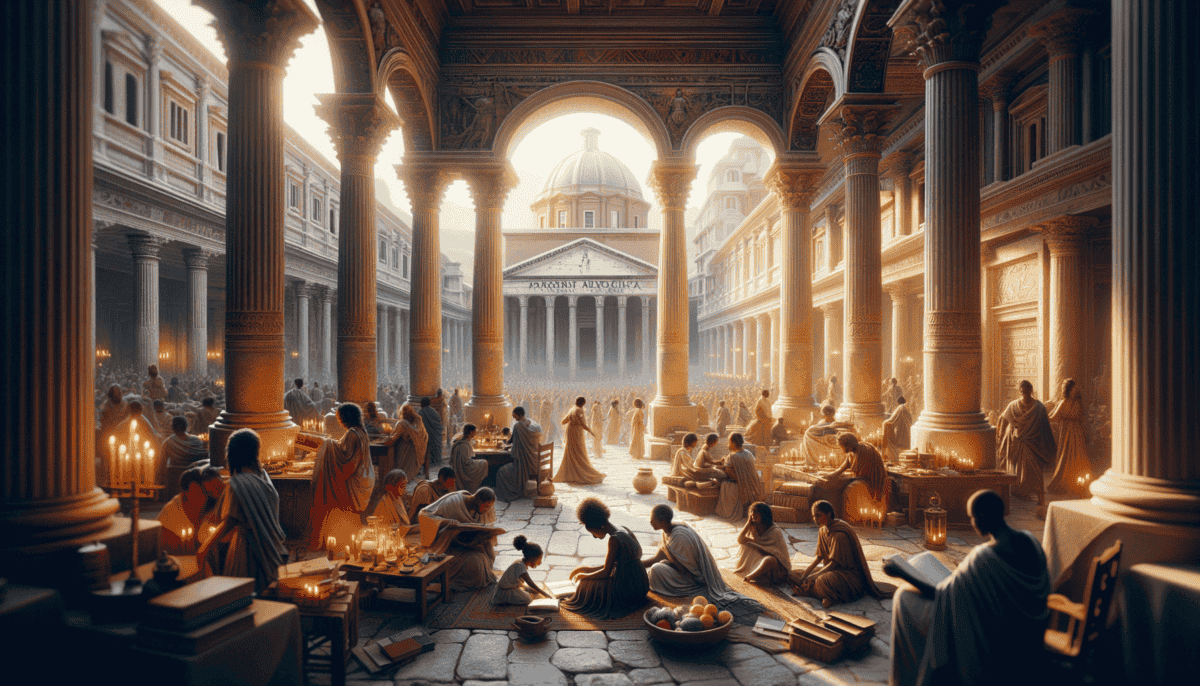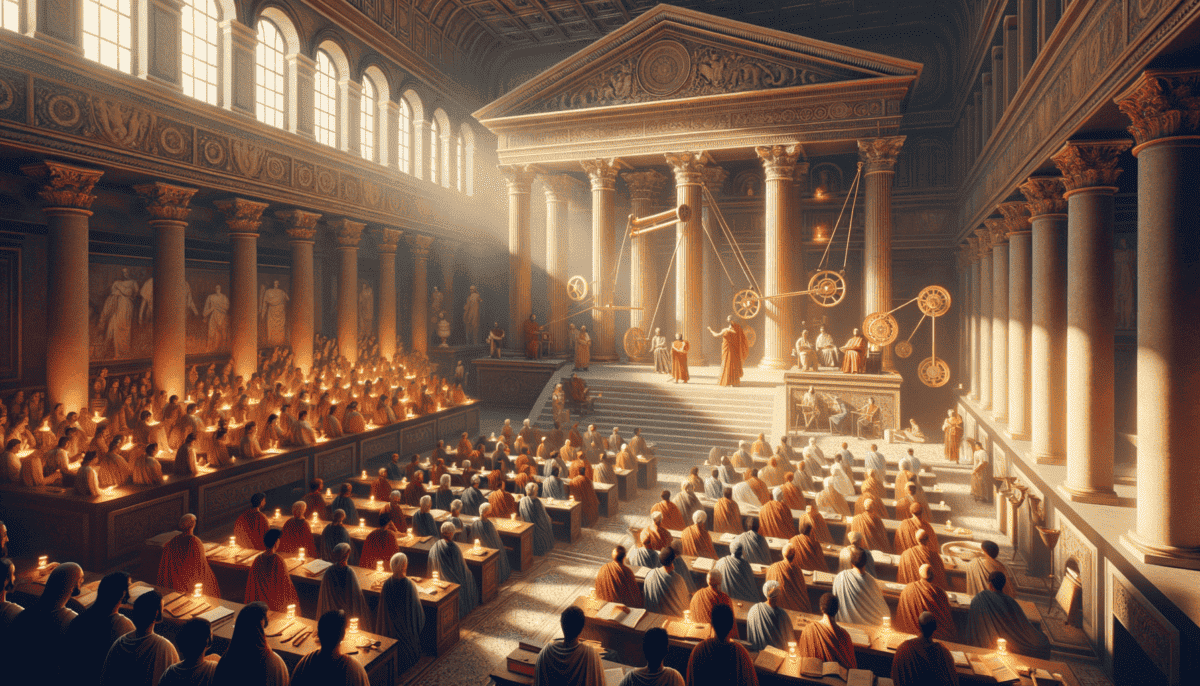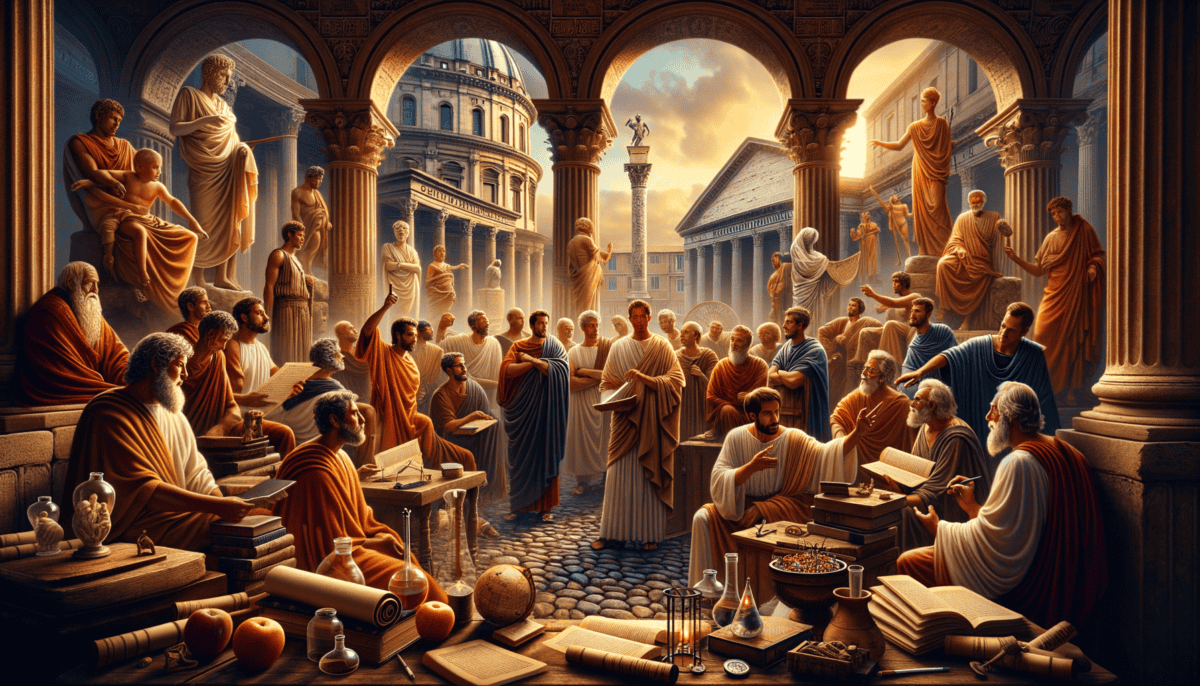Seeds of Knowledge
The sun peeked through the wooden shutters of the small Roman classroom. Young Quintilian sat straight in his chair, his eyes wide with wonder. He was only ten years old, but he knew this day would change his life forever.
"Welcome, young scholars!" called out Master Flavius, his warm smile lighting up the room. "Today, we begin a journey into the world of words and wisdom."
The classroom buzzed with excitement. Twenty children sat on wooden benches, their wax tablets ready on their laps. The walls were covered with scrolls, and a large abacus stood in the corner.
“To become great, we must first learn to be good listeners,” Master Flavius said, tapping his wooden pointer against the wall.
Young Quintilian's heart beat faster. He had dreamed of this moment since watching his older brother attend school. In Rome, education was very important. Rich families sent their children to school to learn reading, writing, and speaking well.
"Master Flavius," a small voice called out. "Why do we need to learn all this?"
The teacher smiled. "Ah, young Marcus, that's a good question. In Rome, education helps us become better citizens. It helps us think clearly and speak well."
Quintilian nodded eagerly. He watched as Master Flavius drew letters on a large slate:
| A | B | C |
"Let's start with the basics," Master Flavius said. "Our letters tell stories, share ideas, and keep our history alive."
The morning passed quickly as they practiced writing letters in their wax tablets. Some children struggled, but Master Flavius helped each one patiently.
A Special Discovery
During lunch break, Quintilian sat under an olive tree, munching on his bread and cheese. He noticed another boy sitting alone, looking sad.
"Hello," Quintilian said, moving closer. "I'm Quintilian. Would you like to share my lunch?"
The boy looked up and smiled shyly. "I'm Lucius. Thank you."
As they ate, they talked about their first day at school. Lucius had trouble writing some letters, but Quintilian offered to help him practice.
Master Flavius watched from afar, smiling. He knew that teaching wasn't just about letters and numbers – it was about helping young minds grow and learn to help others.
That afternoon, Master Flavius taught them about famous Roman stories. He acted out tales of brave heroes and wise leaders, making the whole class laugh and learn at the same time.
"Remember, children," he said, "every great person started just like you – learning their letters and listening to stories."
As the sun began to set, Quintilian didn't want the day to end. He had learned so much, made a new friend, and discovered that school was even better than he had imagined.
Walking home with his new friend Lucius, Quintilian knew this was just the beginning of an amazing journey. He couldn't wait to see what tomorrow would bring in their little Roman classroom, where every day brought new adventures in learning.
Master Flavius watched his students leave, knowing that among them might be future teachers, leaders, and thinkers who would help shape Rome's future. In his heart, he knew that education was the greatest gift he could give these young minds.
The first stars appeared in the sky as Quintilian reached home, his mind full of letters, stories, and dreams of what he might become.
The Philosopher’s Path
The morning sun cast long shadows across the dusty streets of Rome. A young man named Epictetus limped slowly through the crowd, his shoulders bent under the weight of scrolls. Though he was a slave, his eyes sparkled with determination.
"Hurry up, slave!" called his master. "The philosopher Musonius Rufus won't wait forever!"
Despite his bad leg, Epictetus moved as fast as he could. He had been born a slave, but his master let him study philosophy. Every chance he got, he would listen to wise teachers and think about big ideas.
Learning from the Best
"Welcome, young one," said Musonius Rufus, the great teacher. His kind eyes noticed Epictetus's limp. "Come sit closer. Everyone should be able to hear wisdom clearly."
The other students whispered and pointed at the slave boy, but Epictetus didn't mind. He opened his wax tablet and listened carefully.
"True freedom," Musonius taught, "comes from how we think about things, not from what happens to us."
Epictetus wrote these words carefully. They made him feel strong inside, even though his leg hurt and he was still a slave.
A Big Change
Years passed, and Epictetus studied hard. He learned that being happy didn't depend on having lots of things or being free. It came from being good and wise.
| Important Things Epictetus Learned: |
| • Be kind to others • Don't worry about things you can't change • Learn something new every day |
One day, something amazing happened. Epictetus became free! He wasn't a slave anymore. But instead of being angry about his hard past, he decided to become a teacher.
"I want to help others learn what I learned," he told his old teacher Musonius. "Even when life is hard, we can still be good and wise."
In his school, Epictetus taught both rich and poor students. He showed them that anyone could be wise if they tried hard enough.
"Remember," he would say, "it's not what happens to you that matters most. It's how you think about what happens."
A Teacher's Joy
Many of his students became great leaders and thinkers. They wrote down his wise words so others could learn from them too.
"Master Epictetus," a young student asked one day, "how did you become so wise?"
Epictetus smiled. "I learned that true wealth isn't in your pocket – it's in your mind and heart."
As the years went by, more and more people came to learn from Epictetus. They didn't care that he had once been a slave or that he walked with a limp. They cared about his wise words and kind heart.
Every evening, as the sun set over Rome, Epictetus would look at his students with pride. He had shown them that anyone could become wise and good, no matter where they came from.
The stars began to twinkle in the sky, and Epictetus knew that his journey from slave to teacher had been worth every step. His students would carry his teachings forward, making the world a little bit wiser, one lesson at a time.
Rhetoric and Revolution
The grand halls of Rome’s finest school echoed with excited voices. Quintilian stood tall before his students, his toga crisp and white. His heart beat fast – today was special! ️
“Today,” he announced with a bright smile, “we learn to speak like leaders!”
A New Way to Teach
Many teachers in Rome were strict and mean. They made students memorize boring lists and hit them when they made mistakes. But Quintilian was different.
“Learning should be fun!” he would say. “When we enjoy our lessons, we learn better.”
His students sat on comfortable chairs instead of hard benches. They played word games and acted out stories. Other teachers thought this was silly, but Quintilian’s students learned faster than anyone else!
“A good teacher is like a kind parent,” Quintilian often said. “We grow better with love than with fear.”
Speaking Up!
Marcus, a shy student, raised his hand. “Master Quintilian, I’m scared to speak in front of others.”
Quintilian walked over and put a gentle hand on Marcus’s shoulder. “Let’s start small. Tell us about your favorite pet.”
Marcus smiled. “I have a little dog named Rufus…”
Before he knew it, Marcus was telling a wonderful story. His classmates clapped and cheered.
Standing Strong
Not everyone liked Quintilian’s new ways. Old-fashioned teachers complained to the Senate.
“Teaching should be strict!” they said. “These new methods will make students soft!”
But Quintilian stood firm. “Look at my students,” he replied. “They speak better than any others in Rome. They love learning. Isn’t that what matters?”
| Quintilian’s Special Teaching Ways: |
| • Make learning fun • Be kind to students • Practice speaking a lot • Tell lots of stories • Play learning games |
Growing Fame
Soon, even the Emperor heard about Quintilian’s amazing school. Important families from all over Rome wanted their children to learn from him.
“Master Quintilian,” asked a new student one day, “will you teach me to speak like you?”
“Better!” Quintilian answered with a twinkle in his eye. “I’ll teach you to speak like yourself – but the very best version of yourself!” ✨
As the sun set over Rome’s seven hills, Quintilian watched his students practice their speeches in the courtyard. Some spoke about justice, others about courage, and some just told funny stories about their pets.
He smiled, knowing that his new way of teaching would change Rome forever. His students would grow up to be leaders who spoke with both wisdom and kindness. The future was bright with promise, just like the stars beginning to twinkle in the evening sky.
Wisdom Beyond Boundaries
In a beautiful garden filled with sweet-smelling flowers, Cornelia Africana sat with her two young sons. The boys listened closely as their mother taught them about history, numbers, and big ideas.
“Tell us another story, Mother!” little Gaius begged, his eyes bright with excitement.
Tiberius, the older brother, nodded eagerly. “Yes, please! The one about the brave heroes!”
A Different Kind of Teacher
Many people in Rome thought only men could be teachers. But Cornelia showed them something new! She taught her sons at home, giving them lessons that were special and strong.
“My jewels are not gold or silver,” Cornelia would say. “My children are my treasures!”
She taught them about:
| • Being brave and honest • Helping people who need help • Speaking well and clearly • Learning from history • Being kind leaders |
Learning Through Love
One sunny morning, Tiberius asked, “Mother, why do some people in Rome have so much while others have so little?”
Cornelia smiled softly. “That’s a very good question, my dear. Let’s think about how we can help make things better for everyone.”
Growing Wisdom
Other Roman ladies came to visit Cornelia’s garden. They showed off their pretty jewelry and fine clothes.
“Where are your jewels, Cornelia?” they asked.
Cornelia hugged her sons close. “These are my jewels,” she said proudly. “No gold can shine brighter than a mind full of wisdom!” ✨
Making a Difference
As the boys grew older, they remembered their mother’s lessons. They worked hard to help poor people in Rome. They spoke up for what was right, just like their mother taught them.
“Mother,” Gaius said one evening, “today I helped a farmer keep his land. I remembered what you taught us about being fair.”
Cornelia beamed with pride. Her teaching was changing Rome, one kind act at a time.
A Mother’s Dream
People all over Rome started talking about Cornelia’s way of teaching. They saw how smart and good her sons had become.
“Maybe mothers can be great teachers too,” they said. “Look at how well Cornelia’s boys turned out!”
In her peaceful garden, surrounded by flowers and birds, Cornelia kept teaching. She knew that good ideas could come from anyone – boys or girls, rich or poor.
As the sun set over Rome, Cornelia watched her sons study and practice their speeches. She smiled, knowing that her lessons would live on through them. The evening star twinkled above, just like the spark of knowledge in her children’s eyes.
Science and Imagination
The sun rose over Syracuse, casting golden light on a curious sight. Archimedes sat in his courtyard, drawing shapes in the sand. Around him, excited students watched as he solved big puzzles with small lines.
“Look here, young ones,” Archimedes called out, drawing a circle. “Do you see how this shape holds special secrets?”
The Wonder of Numbers
“But Master Archimedes,” little Marcus asked, “why do we need to know about circles?”
Archimedes smiled and picked up a round shield. “Watch this!” He rolled it down a gentle slope. “See how perfectly it moves? That’s the magic of circles!” ⭕
“The laws of nature are hiding in shapes and numbers. We just need to look carefully to find them!”
Making Learning Fun
Archimedes knew that big ideas could be scary. So he made games to help his students learn:
|
• Building tiny boats • Playing with water and sand • Making shapes with sticks • Solving fun puzzles • Drawing in the dirt |
The Famous Bath Day
One day, Archimedes jumped out of his bath shouting “Eureka!” (That means “I found it!”) He ran through the streets, too excited to remember his clothes!
Helping the City
“Teacher,” Julia asked, “why do you make so many machines?”
Archimedes looked up from his latest invention. “Because science can help people! Look at this water screw – it helps farmers water their crops!”
Learning by Doing
The students loved when Archimedes let them try things themselves. They built small machines and tested ideas in the courtyard.
“Remember,” he told them, “your mind is like a flower. Give it sun and water, and watch it grow!”
Sharing Knowledge
People came from far away to learn from Archimedes. He taught them about:
• Numbers and shapes
• Building better tools
• Solving big problems
• Making useful machines ⚙️
A Teacher’s Dream
As the day ended, Archimedes watched his students try new ideas. Some built tiny boats. Others drew shapes. All of them were learning and having fun.
“What will you invent next, Teacher?” asked Marcus.
Archimedes smiled. “The question is, what will YOU invent? Your minds are full of wonderful ideas waiting to grow!” ✨
As night fell over Syracuse, the stars twinkled above Archimedes’ courtyard. His students went home with heads full of dreams and hearts full of wonder. Tomorrow would bring new discoveries, new questions, and new adventures in learning.
A Light That Never Fades
The grand halls of Rome buzzed with excitement. Students from all the famous teachers gathered together for a special celebration. Young and old came to share stories about their amazing teachers.
Sharing Stories
“My teacher Quintilian taught me to speak with courage,” said Marcus, standing tall. “Now I help others find their voice too!”
Julia smiled and added, “And Archimedes showed us that learning can be fun. I now teach children about stars and numbers.” ⭐
“Our teachers gave us more than lessons – they gave us wings to fly!” proclaimed Lucius, an old student of Epictetus.
The Growing Garden
In a quiet corner, an elderly woman named Claudia shared memories of Cornelia Africana:
Passing the Torch
The students had become teachers themselves. They now shared what they learned with new students. The knowledge kept growing, like a big family tree of learning.
|
Things Their Teachers Taught Them: • Be brave and kind • Never stop asking questions • Help others learn • Make learning fun • Share knowledge freely |
A Special Discovery
“Look what I found!” shouted young Flavius, holding up an old scroll. It was filled with drawings from Archimedes and words from Quintilian.
Building Bridges
People from different places started coming to Rome to learn these special ways of teaching. The ideas spread far and wide, like seeds in the wind.
“Our teachers built bridges between yesterday and tomorrow,” said an old scholar. “Their wisdom helps us make the world better.”
The Greatest Gift
As the celebration ended, everyone lit small candles. Each flame represented a teacher’s wisdom, burning bright in their students’ hearts. ️
Forever Learning
“What happens now?” asked a young student.
An old teacher smiled and said, “We keep learning and teaching. That’s how we honor our teachers’ memory.”
Under the Roman stars, the students and teachers knew that their learning journey would never end. Each new day brought chances to grow, discover, and share – just like their beloved teachers had shown them. The light of knowledge would shine forever, passed from hand to hand, heart to heart, through all the ages to come.


